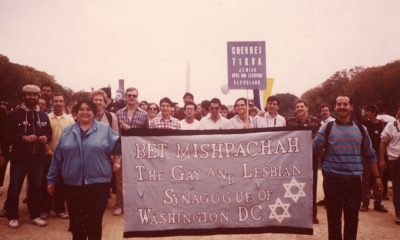World
Out in the World: LGBTQ news from Europe and Asia
Qatar has detained a man with HIV who is a dual British and Mexican citizen

AUSTRALIA

As the 46th Sydney Gay and Lesbian Mardi Gras ended its two week long celebrations with the annual massive Mardi Gras parade on Oxford Street this past weekend, this year’s celebration marred by the murder of a gay couple that jarred the country’s entire LGBTQ community, the parade came to a halt on Saturday in a powerful act of remembrance for the couple, Jesse Baird and Luke Davies.
In its annual float, Qantas Airways paid tribute to Davies who worked for the carrier as a flight attendant. A Qantas spokesperson confirmed that Davies’ name was added prominently on the side of the Qantas float, and Executive Manager Crew Leeanne Langridge in a statement said that Davies “was a much-loved member of the Qantas cabin crew community in Brisbane and Sydney.
“He had a passion for travel, life, his family and friends and the customers that he served. He will be deeply missed. The whole team at Qantas are thinking of Luke and Jesse’s loved ones,” Lanridge said.
The Star Observer, the country’s largest queer news media outlet, reported that a New South Wales police officer, Beaumont Lamarre-Condon, who reportedly once dated Baird, a Network 10 reporter and a sports official who umpired in AFL matches in the Northern Football and Netball League, has been charged with their murders.
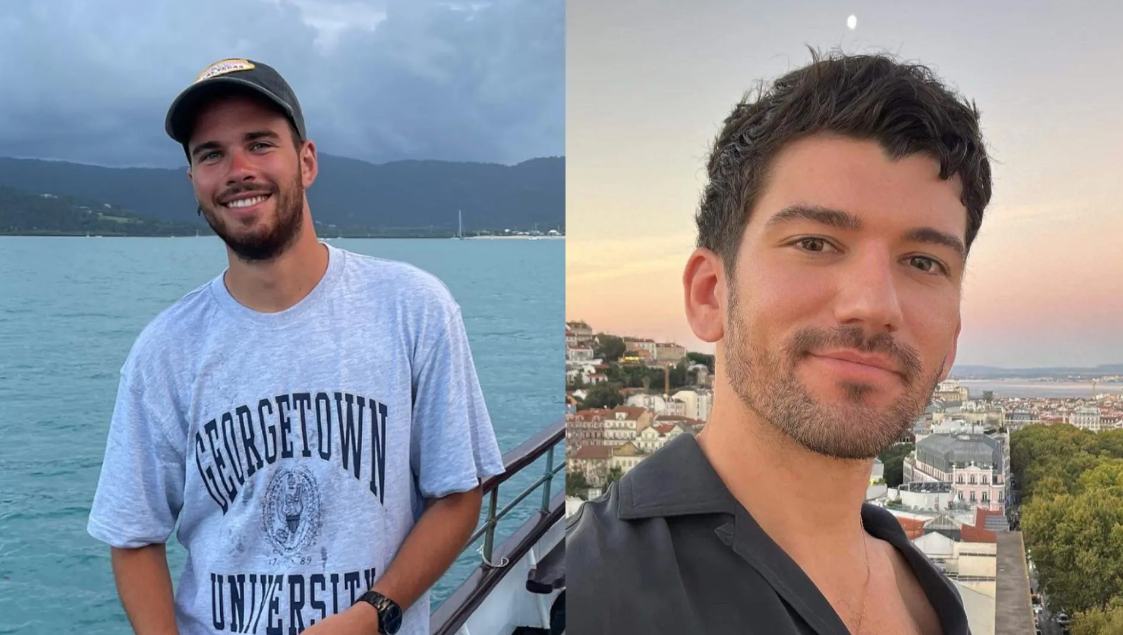
Lamarre-Condon is accused of shooting them dead with his police-issued sidearm at Baird’s home in Paddington, Sydney. The couple’s remains were found at a property at Bungonia, near Goulburn, around 115 miles south of Sydney on Feb. 27, 2024.
The murder of the couple caused the Sydney Gay and Lesbian Mardi Gras organizers to uninvite police from the iconic Mardi Gras parade the BBC reported.
The parade’s board said the decision to exclude police, who have taken part in the annual march for over two decades, was “not taken lightly” but that it was essential to create a safe environment “to protest, celebrate” and “honor and grieve those we’ve lost.”
Sydney’s Mardi Gras parade has a complex history of both LGBTQ activism and police brutality, after the first march in 1978 resulted in dozens of people being beaten and arrested by local officers, the BBC noted.
CHINA

A Chinese transgender activist is facing deportation back to mainland China as she is scheduled for release on Sunday from Siu Lam Psychiatric Center, a psychiatric detention institution where Hong Kong authorities usually hold trans detainees.
Lai Ke, also known as Xiran, was convicted of using “forged” documents to attempt to travel from China to Toronto via Hong Kong last year. Lai was detained at Hong Kong International Airport on May 3, 2023, while transferring to a flight to Toronto having begun her journey in Shanghai.
Lai was convicted in a Hong Kong court on June 16, 2023, and sentenced to 15 months in prison, which she served at the Siu Lam Psychiatric Center. A release notice from the Siu Lam Psychiatric Center seen by Amnesty International states that Lai is due to be released early for good behavior on March 2. As Lai is not a resident of Hong Kong, she is subject to being deported to mainland China under Section 19 of the Hong Kong Immigration Ordinance.
“Time is of the essence to prevent Lai Ke from being unlawfully deported to mainland China, where she would be at grave risk of serious human rights violations — including arbitrary detention, unfair trial, and even torture and other ill-treatment — due to both her transgender identity and her activism,” Sarah Brooks, the deputy regional director for Asia for Amnesty International said.
“To return her given these risks would be an abandonment of Hong Kong’s obligations under international law.”
Lai had been a vocal advocate for trans rights in China alongside her partner. According to her friends, her partner was imprisoned in China in June 2023 on account of her own activism and her trans identity.
While serving her sentence, Lai has been denied access to the medication she was taking as a part of her hormone replacement therapy and held in solitary confinement for complaining about the denial of her medical treatment, her friends added.
“There is a very real risk that Lai Ke will face persecution — including further imprisonment — if she is returned to mainland China,” said Brooks.
PHILIPPINES
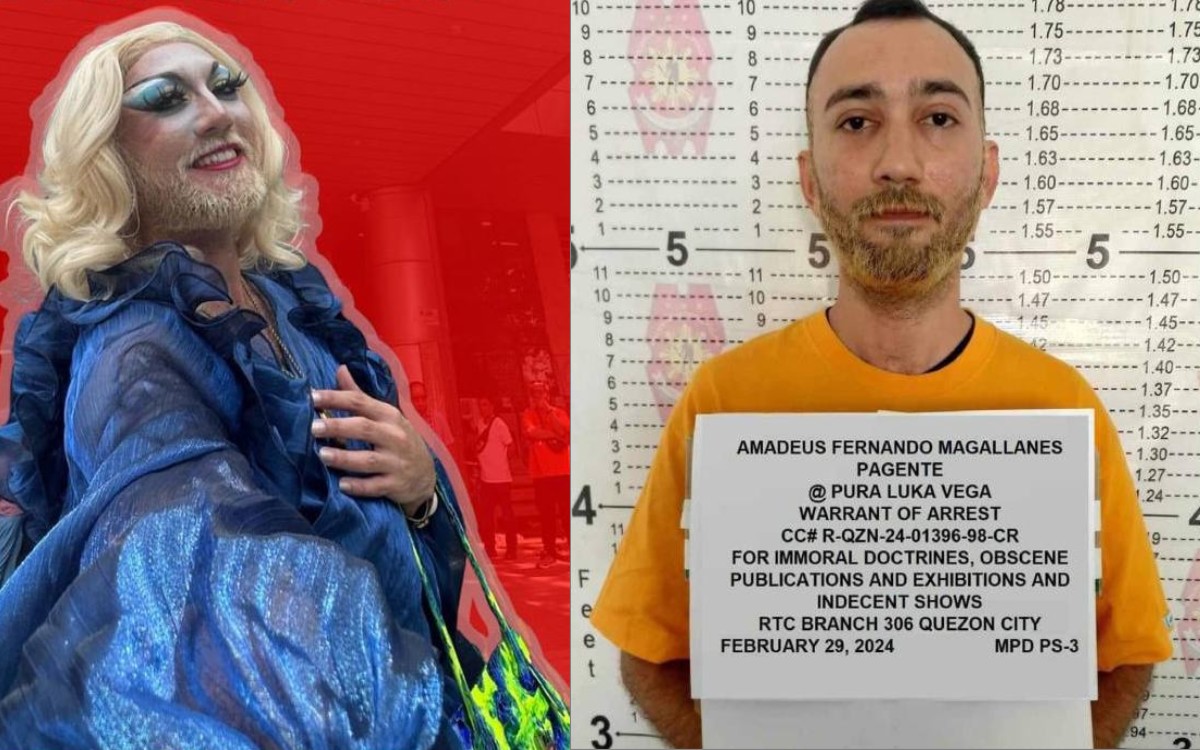
A 33-year-old drag queen who had been incarcerated in a Manila jail last fall for allegedly violating the Catholic-majority country’s obscenity laws for his performance dressed as Jesus Christ, performing a rock version of the Lord’s Prayer in Tagalog, was arrested again this past week.
Investigators from the Manila Police District, charged Amadeus Fernando Pagente, who performs under the stage/drag name Pura Luka Vega, for six counts of alleged violation of Article 201 including immoral doctrines, obscene publications and exhibitions and indecent shows. The arrest of the drag artist on Feb. 29 was due to a warrant issued by a court in Quezon City.
Supporters and fans raised the bail of 720,000 Philippine pesos, ($12,852.55) and Pagente was released on March 1. In a post on X, formerly Twitter, the drag artist thanked his benefactors writing: “The fight still goes on, life still goes on. I am very grateful to those who helped me with my bail. To my drag sisters who tirelessly helped me and organized fund raising for legal fees, thank you very much. Thank you.”
These latest charges stem from a complaint issued by the Kapisanan ng Social Media Broadcasters ng Pilipinas, a broadcast media organization, on behalf of Philippines for Jesus Movement.
This is the second time the Philippines for Jesus Movement, comprising Protestant church leaders, has registered a criminal complaint with prosecutors against the drag performer. He was accused of violating obscenity laws for his performance dressed as Jesus Christ, performing a rock version of the Lord’s Prayer in Tagalog last August. He was incarcerated and then later released.
At the time Pagente told Agence France-Presse: “The arrest shows the degree of homophobia” in the Philippines. “I understand that people call my performance blasphemous, offensive or regrettable. However, they shouldn’t tell me how I practice my faith or how I do my drag.”
Ryan Thoreson, a specialist at the Human Rights Watch’s LGBT rights program, also called for the charges against Pagente to be dropped. “Freedom of expression includes artistic expression that offends, satirizes or challenges religious beliefs,” Thoreson told the BBC.
UKRAINE
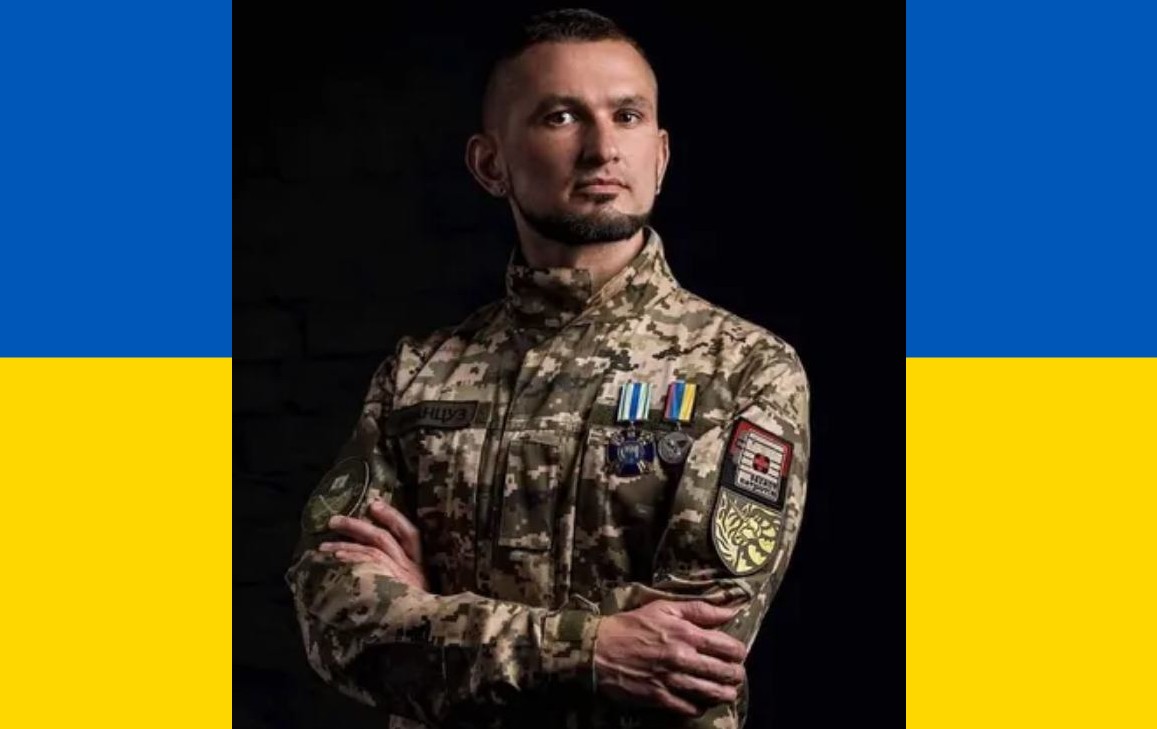
A Ukrainian army combat medic was stripped of honors awarded to his unit by the Ukrainian Orthodox Church after the church leadership was informed that he was gay.
Viktor Pylypenko, a medic with 1st mechanized battalion, 72nd Black Zaporozhians Brigade medical corps, along with his fellow servicemembers were awarded medals for “sacrifice and love to Ukraine” by the Ukrainian Orthodox Church of the Kyiv Patriarchate’s Patriarch Filaret for their actions and deeds serving in the Donbas region against the Russian invaders.
Pylypenko who serves as an openly gay soldier together with the commander of the medical corps, Yurii Lytvynenko, arrived from Donbas to receive the medals from Filaret. The patriarch personally thanked Pylypenko for his service.
According to the Ukrainian news website obozrevatel.com, that after receiving the award, the soldier published a post on his Facebook page thanking Filaret for the award, thinking that in this way the UOC changed its attitude towards the LGBTQ community.
“I am sincerely glad that Patriarch Filaret took such a step and thanked me, an openly gay man and human rights activist, for the protection. He gave me a medal with his signature and seal. He and the Kyiv Patriarchate headed by him have radically changed their position on LGBTQ+ people and no longer consider us ‘sinful’ or the cause of the coronavirus,” Pylypenko wrote.
On Feb. 25 the church responded in its own Facebook post calling Pylypenko’s post a falsehood:
“Among the distinguished military personnel of the medical point was Victor Pylypenko. Unfortunately, on his social media pages, he posted false information about Patriarch Filaret awarding him a distinction as openly gay for human rights and that Patriarch Filaret and the Kyiv Patriarchate radically changed their negative position on LGBT.
This is an outright lie and manipulation.
Taking into account the efforts of the dark forces to distort the consistent position of the upc of the Kyiv Patriarchate, we want to officially state:
1. Soldier Victor Pilipenko received a thank you from the church, exclusively as a defender of Ukraine, not as an LGBT activist, at the submission of his fellow soldiers from the combat unit of the heroic 72nd Brigade of the Black Zaporozhye. Patriarch Filaret did not personally award the Pilipenkoví medal and did not know about his sinful tendencies.
2. Holy Patriarch Filaret and the Ukrainian Orthodox Church of the Kyiv Patriarchate, based on the foundations of the Holy Scriptures, the thousand-year teaching of the Orthodox Church, invariably occupies a principled negative position on Sodom sin, condemns propaganda t. zv ‘same-sex marriages.’ Homosexual sex relationships are a false distortion of the God-given nature of man. As said in the Bible, the Lord Himself for the sins of people destroyed Sodom and Homorrah. The patriarch repeatedly stated it publicly and in court proved the legality of such his right.
3. We thank warrior Victor Pilipenko (as well as all our defenders for defending our liberty and territorial integrity) for his military service, but we do not divide his sinful likeness and LGBT agitation. We inform that due to open propaganda of sinful ideology and the denial of the existence of God, consider the church award to Victor Pilipenko from 08.02.2024 Order no. 27468 — revoked.
The Apostle Paul in the first letter to the Corinthians warned: ‘he deceive yourself: Neither prostitutes, nor idolosuluzeliji, nor adulterous, nor malakí̈, nor mužoložcí, nor thieves, nor lehvari, nor drunkards, nor lihoslovci, nor predators — the kingdom of God will not inherit. And such were some of you; but washed, but sanctified, but justified in the name of our Lord Jesus Christ and by the Spirit of our God’ (1 Cor. 6, 9-11).
Based on the foundations of Christian evangelical love for all, sinners in particular, desiring them salvation, we urge everyone to repent of their personal sins.
Then the church’s press service said: “We would like to inform you that in view of the open propaganda of a sinful ideology and the denial of the existence of God, the church award to Viktor Pylypenko is hereby revoked.”
Pilipenko then accused the Kyiv Patriarchate of awarding the medals as a PR campaign:
“I wrote words of gratitude to Filaret, naively imagining that he deliberately awarded me and showed his colleagues a Christian, undoubtedly noble gesture, a signpost to reconciliation and mutual respect for gays, atheists, and people of other faiths. But everything turned out to be more prosaic: Filaret was just handing out his awards as a PR campaign for his denomination.”
Outrage from his fellow soldiers and others has been building regarding the Kyiv Patriarchate’s actions.
Ilia Krotenko, a fighter with the 72nd Black Zaporozhians Brigade, emphasized that the “trinkets” handed out by the church are worthless.
“In connection with the absolutely disgusting act of the UOC-Kyiv Patriarchate and Patriarch Filaret, who took away the award from war veteran Viktor Pylypenko only because he is openly gay, I also refuse a similar award of my own,” he wrote.
SLOVENIA
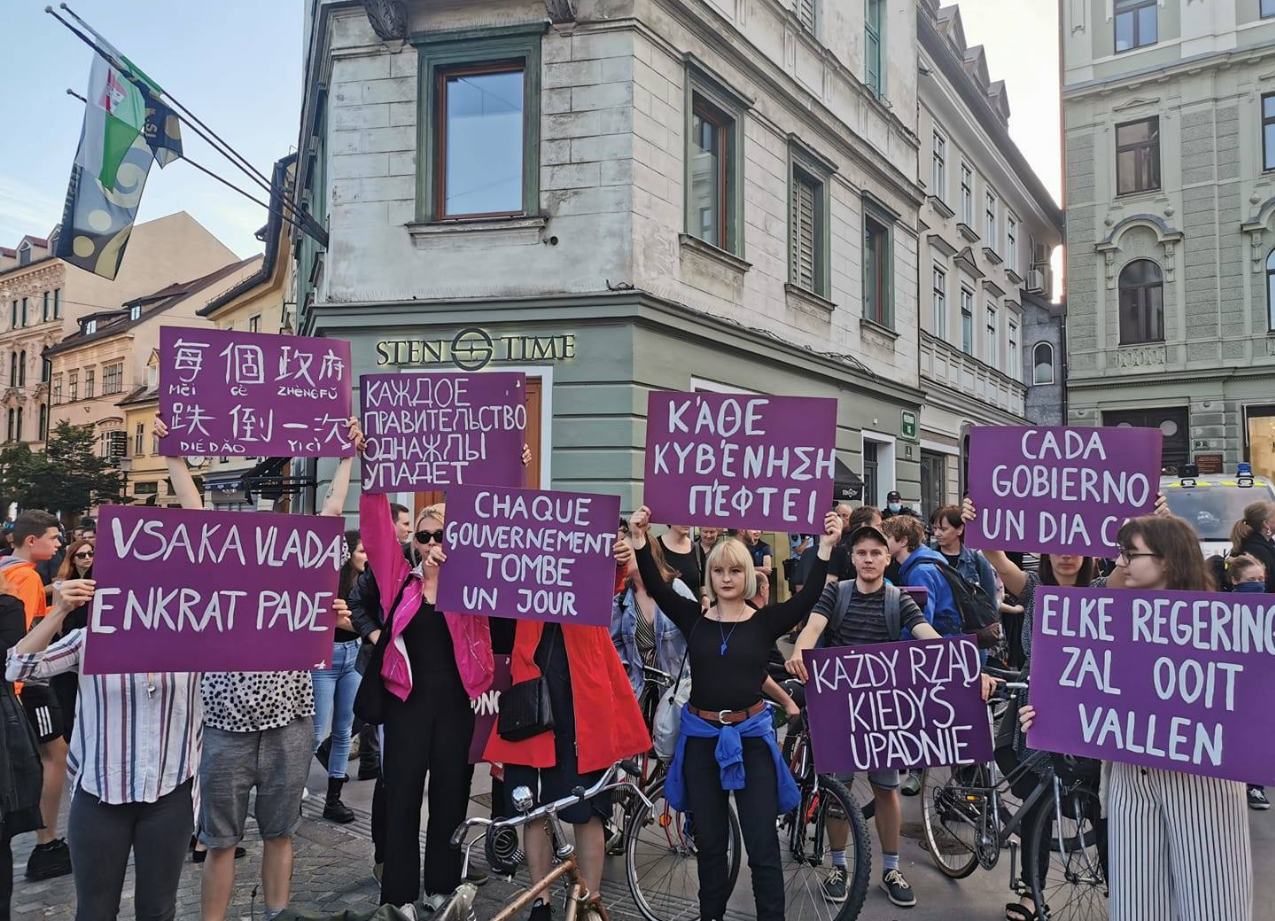
Activists from across Europe, including Slovenia, Spain, France and Poland formed an alliance to launch a petition to collect over 300,000 signatures as a first step towards laying the groundwork to ensure that in Europe, reproductive rights are safeguarded and accessible for each and every woman.
This event marks a pivotal moment where voices from diverse European nations unite to advocate for reproductive rights, underscoring the collective resolve to ensure the safety and accessibility of abortion services across the continent.
Nika Kovac, founding director of the 8th of March Research Institute, part of the new alliance, said, “The need to kick off the petition is driven by a deep concern over the erosion of reproductive rights, as witnessed in various parts of the world, including the United States and Poland. We are dedicated to creating a network of friends united by shared values of empathy and solidarity. The key to change is international solidarity.”
“The freedom to choose our body is a common value in every single country of Europe. We are here to demand that it also becomes a right that everyone has in practice,” she added.
Though a large majority of Europeans support abortion, the values of women’s bodily autonomy and their freedom to choose are not shared by all governments and state laws. In a significant number of EU countries, legal and access restrictions prove to be a considerable hurdle for those who need it the most. Slovenia has proven to be a significant outlier, being the only European country to enshrine the right to abortion in its constitution with France currently trying to do the same.
“Ban on abortion kills women, ban on abortion ruins lives and the lack of access to abortion kills women and ruins lives,” said Marta Lempart, founder of Polish Women’s Strike, who has been the loudest advocate for reproductive rights in the country.
“In my country, women die in state hospitals because they are denied abortions. Each time it happens, we cry and protest and say ‘not one more’ but today I am not here to cry and shout but to say that we can get through it. You will never walk alone.”
“In many countries, abortions are legal but not free, so, it’s only for rich people; Also, in many countries abortions are legal, but women are intimidated, and humiliated for accessing a health service. This should not be happening. We need solidarity as we need to protect women not only in Poland but across Europe.”
Alice Coffin, who leads permanent action against patriarchal structures that harm French society and is a member of the alliance, said, “While Poland is infamous for severely restricted access to abortion, populist far-right parties with the same agenda are emerging across the continent. Their anti-abortion agenda is rarely in the forefront of their public communication but it becomes an important policy point if they achieve power. However, there is widespread public opposition to these measures.”
She added, “The French Senate is due to vote on including abortion in its constitution on Wednesday, Feb. 28. The president of the Senate is opposed. The Vatican has expressed its anger. But we have every hope that it will come to pass. So, abortion is an issue that will be very much on the political and media agenda in France over the next few days.”
The petition will actively be distributed among various individuals across multiple countries to ensure wide reach and engagement with the aim of gathering an initial 300,000 signatures. With this petition, the coalition hopes to build momentum and support for the substantive changes they aim to achieve.
The initiative represents a powerful, united front of committed individuals and organizations, and was attended by prominent feminist activists including Nika Kovač who has been one of the initiators of the #MeToo movement in Slovenia; Lempart, activist, and founder of the Polish Women’s Strike, who has been the loudest advocate for reproductive rights in a country with an almost total ban on abortions and has organized the biggest pro reproductive rights protests in the history of Poland; Alice Coffin, renowned feminist and author from France; Silvia Casalino, activist from France, along with Dr. Imma Clarà, director of the Spanish organization L’Associació; LGBTQ activist and researcher Kika Fumero; feminist activist and journalist Cristina Fallarás who launched the Spanish #MeToo movement. #Cuéntalo (Spain) participated in the petition launch.
The coalition’s political stance stems from a fundamental disagreement with the reality that women in Europe still face life-threatening risks due to lack of access to safe abortion services.
The coalition’s overall goal is to safeguard and advance abortion rights across Europe, ensuring that all women have access to the safe, respectful and legal healthcare services they deserve.
QATAR
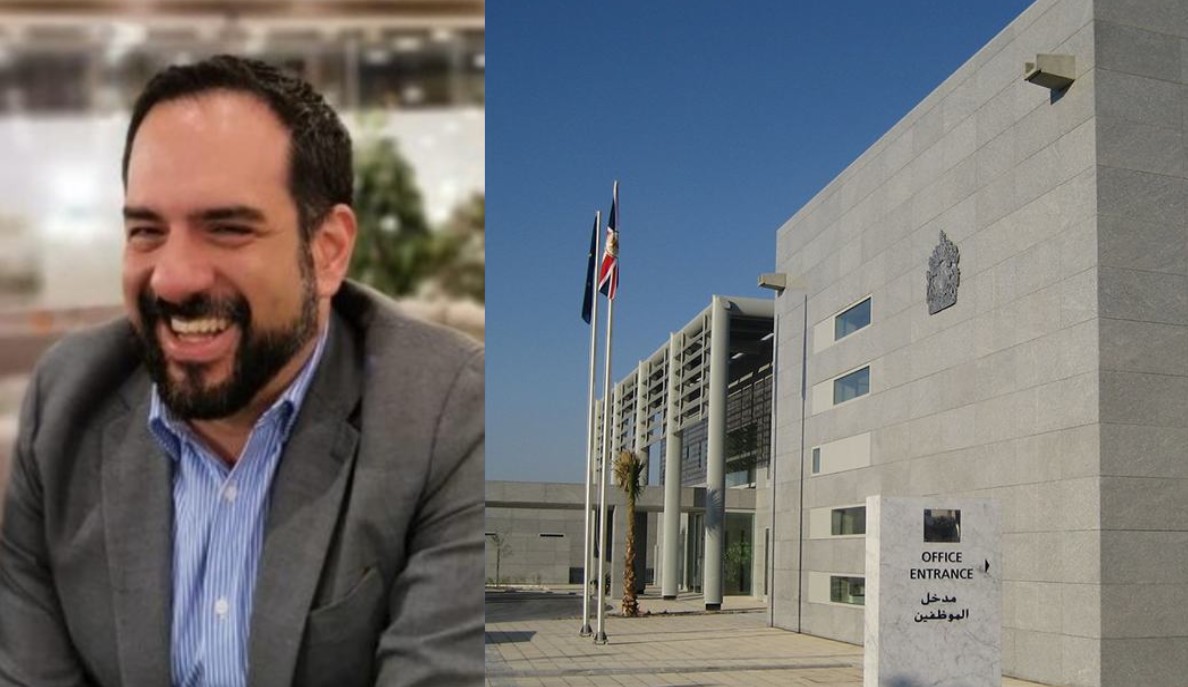
An HIV positive openly gay dual British and Mexican citizen is being held because of his sexuality in this peninsular Arab country bordering the Persian Gulf. Manuel Guerrero Aviña, 44-year-old Qatar Airways employee, has been imprisoned since Feb. 4 after responding to a false Grindr text.
PinkNewsUK reported according to his brother Enrique Aviña, who is leading the campaign QatarFreeManuel, his brother is being imprisoned because of his sexuality, and has been denied access to antiretroviral medicines.
“Qatar police used a false Grindr profile to contact Manuel and invite him to participate in a meeting with other people from the LGBT community in the city of Doha,” Enrique Aviña told British newspaper the Mirror.
“Manuel was supposed to meet a person he thought he had arranged an appointment with on the night of Feb. 4 but instead encountered police officers who were waiting to arrest him.”
“He has been denied the right to a lawyer and has been forced to sign documents in Arabic without a translator to assist him. Even worse, he has been prevented access to antiretroviral medicines he needs to be able to live with HIV, which constitutes an act of torture and puts his life at risk,” Enrique Aviña said.
PinkNewsUk also reported because Aviña registered as a British national when he was hired by Qatar Airlines and moved there to work, the Mexican Embassy in Qatar said, the British Embassy is dealing with his case, but Mexican consular officers been in contact with his family.
“With regards to the case of Manuel Guerrero Aviña, who has Mexican and British nationality and is currently under arrest in Doha, the Mexican Embassy in Qatar confirms it has been following developments since it was informed about the detention,” an embassy statement read.
“It has been in constant contact with his relatives and has confirmed Manuel has legal representation.”
A spokesperson for the UK Foreign Office told PinkNewsUK: “We are providing consular assistance to a British man who is detained in Qatar and are supporting his family.”
Additional reporting from the Star Observer, ABC News Australia, the BBC, Agence France-Presse, Obozrevatel.com, Kyiv Post and PinkNewsUK.
Latin America
Protests, demands for rights define Pride month in Latin America
More than 3 million people participated in São Paulo march

Activists across Latin America marked Pride month with massive demonstrations, cultural activities, and demands that their countries guarantee equality and protect LGBTQ people from violence.
From Santiago, Chile, to Mexico City, activists took to the streets to celebrate the rights that have been won and the many that are still pending.
Chile
The Pride march that the Movement for Homosexual Integration and Liberation (Movilh) and Fundación Iguales organized took place in downtown Santiago, the country’s capital, on June 22. Authorities and the two organizations say more than 120,000 people participated.
Under the slogan “Pride with memory and hope,” marchers demanded lawmakers approve a bill that would allow reparations for LGBTQ Chileans who Gen. Augusto Pinochet’s dictatorship targeted. There were also calls for the government to promote an LGBTQ-inclusive educational reform.
“This time we are marching on high alert,” said Movilh spokesperson Javiera Zúñiga. “For the first time in decades, we are losing achieved rights. We demand the state wake up. The reform of the Zamudio Law has been stalled for 13 years.”
Marches also took place in Valparaíso, Antofagasta, Temuco, and Concepción, highlighting the growing visibility of transgender groups and feminist organizations.
Mexico
Mexico City on June 29 was the epicenter of one of the region’s largest Pride marches.
More than 300,000 people participated in the march. Comité IncluyeT organized the 46th annual march under the slogan “Not one step back: rights are respected.”
Several organizations denounced the increase in hate crimes — Mexico’s National Observatory of Hate Crimes notes more than 80 LGBTQ people have been reported murdered in the last year. They also urged Mexican lawmakers to criminalize transfeminicides across the country.
Argentina
Although Buenos Aires’s official Pride march takes place in November, the Argentine LGBT+ Federation and other groups in the Argentine capital and in other cities across the country in June organized activities.
More than 5,000 people on June 24 marched from Plaza de Mayo to the Argentine Congress to reject the government’s dismantling of public policies. President Javier Milei’s decision to eliminate the country’s Women, Gender, and Diversity Ministry and cut sexual health programs were among the moves the protesters denounced.
“Today Pride is also resistance to the adjustment,” pointed out Comunidad Homosexual Argentina, an LGBTQ advocacy group.

Colombia
Thousands of people in Bogotá, the Colombian capital, and the cities of Medellín, Cali, and Barranquilla marched on June 29.
The marchers’ slogan was “diversity is also peace,” in a context where violence against LGBTQ people remains high. Caribe Afirmativo, a Colombian LGBTQ rights group, notes more than 45 people from the community has been reported killed in the country over the last 12 months, with most of them trans women.
Organizations also demanded lawmakers resume debate of a bill that would extend comprehensive protections to LGBTQ Colombians. The measure has been stalled in Congress since 2023.
Brazil
More than 3 million people participated in the 28th São Paulo LGBTQ+ Pride Parade that took place on the city’s Paulista Avenue on June 22.
The parade took place under the slogan “LGBT+ social policies: we want the whole thing, not half of it.” Organizers demanded expanded access to health care, employment, and education for the most vulnerable communities, especially Black trans people. They also denounced ultraconservative figures who seek to curtail LGBTQ rights.
Peru and Paraguay
More than 15,000 people took part in a Pride march in Lima, the Peruvian capital, on June 28. Participants demanded lawmakers approve a trans rights law, which has been stalled in the Peruvian Congress since 2016, and recognition of civil unions.
Members of SomosGay, a Paraguayan LGBTQ rights group, and other organizations participated in a Pride march that took place in Asunción, the country’s capital, on June 29.
The march took place without incident, despite threats and anti-LGBTQ hate speech on social media. Participants demanded an end to anti-LGBTQ discrimination and rhetoric from social and religious groups.
Central America
Upwards of 2,000 people participated in a Pride march in Tegucigalpa, the Honduran capital, on June 22. A Pride demonstration took place in San Salvador, the capital of neighboring El Salvador, on June 28.
India
Anaya Bangar challenges ban on trans women in female cricket teams
Former Indian cricketer Sanjay Bangar’s daughter has received support

Anaya Bangar, the daughter of former Indian cricketer Sanjay Bangar, has partnered with the Manchester Metropolitan University Institute of Sport in the U.K. to assess her physiological profile following her gender-affirming surgery and undergoing hormone replacement therapy.
From January to March 2025, the 23-year-old underwent an eight-week research project that measured her glucose levels, oxygen uptake, muscle mass, strength, and endurance after extensive training.
The results, shared via Instagram, revealed her metrics align with those of cisgender female athletes, positioning her as eligible for women’s cricket under current scientific standards. Bangar’s findings challenge the International Cricket Council’s 2023 ban on transgender athletes in women’s cricket, prompting her to call for a science-based dialogue with the Board of Control for Cricket in India and the ICC to reform policies for transgender inclusion.
“I am talking with scientific evidence in my hand,” Bangar said in an interview posted to her Instagram page. “So, I hope, this makes an impact and I will be hoping to BCCI and ICC talking with me and discussing this further.”
On Nov. 21, 2023, the ICC enacted a controversial policy barring trans women from international women’s cricket. Finalized after a board meeting in Ahmedabad, India, the regulation prohibits any trans player who has experienced male puberty from competing, irrespective of gender-affirming surgery or hormone therapy. Developed through a 9-month consultation led by the ICC’s Medical Advisory Committee, the rule aims to safeguard the “integrity, safety, and fairness” of women’s cricket but has drawn criticism for excluding athletes like Canada’s Danielle McGahey, the first trans woman to play internationally. The policy, which allows domestic boards to set their own rules, is slated for review by November 2025.
Bangar shared a document on social media verifying her participation in a physiological study at the Manchester Metropolitan University Institute of Sport, conducted from Jan. 20 to March 3, 2025, focused on cricket performance. The report confirmed that her vital metrics — including haemoglobin, blood glucose, peak power, and mean power — aligned with those of cisgender female athletes. Initially, her fasting blood glucose measured 6.1 mmol/L, slightly above the typical non-diabetic range of 4.0–5.9 mmol/L, but subsequent tests showed it normalized, reinforcing the study’s findings that her physical profile meets female athletic standards.
“I am submitting this to the BCCI and ICC, with full transparency and hope,” said Bangar. “My only intention is to start a conversation based on facts not fear. To build space, not divide it.”
In a letter to the BCCI and the ICC, Bangar emphasized her test results from the Manchester Metropolitan University study. She explained that the research aimed to assess how hormone therapy had influenced her strength, stamina, haemoglobin, glucose levels, and overall performance, benchmarked directly against cisgender female athletic standards.
Bangar’s letter to the BCCI and the ICC clarified the Manchester study was not intended as a political statement but as a catalyst for a science-driven dialogue on fairness and inclusion in cricket. She emphasized the importance of prioritizing empirical data over assumptions to shape equitable policies for trans athletes in the sport.
Bangar urged the BCCI, the world’s most influential cricket authority, to initiate a formal dialogue on trans women’s inclusion in women’s cricket, rooted in medical science, performance metrics, and ethical fairness. She called for the exploration of eligibility pathways based on sport-specific criteria, such as haemoglobin thresholds, testosterone suppression timelines, and standardized performance testing. Additionally, she advocated for collaboration with experts, athletes, and legal advisors to develop policies that balance inclusivity with competitive integrity.
“I am releasing my report and story publicly not for sympathy, but for truth. Because inclusion does not mean ignoring fairness, it means measuring it, transparently and responsibly,” said Bangar in a letter to the BCCI. “I would deeply appreciate the opportunity to meet with you or a representative of the BCCI or ICC to present my findings, discuss possible policy pathways, and work towards a future where every athlete is evaluated based on real data, not outdated perceptions.”
Before her transition, Bangar competed for Islam Gymkhana in Mumbai and Hinckley Cricket Club in the U.K., showcasing her talent in domestic cricket circuits. Her father, Sanjay Bangar, was a dependable all-rounder for the Indian national cricket team from 2001 to 2004, playing 12 test matches and 15 One Day Internationals. He later served as a batting coach for the Indian team from 2014 to 2019, contributing to its strategic development.
Cricket in India is a cultural phenomenon, commanding a fanbase of more than 1 billion, with more than 80 percent of global cricket viewership originating from the country.
The International Cricket Council, the sport’s governing body, oversees 12 full member nations and more than 90 associate members, with the U.S. recently gaining associate member status in 2019 and co-hosting the 2024 ICC Men’s T20 World Cup. The BCCI generated approximately $2.25 billion in revenue in the 2023–24 financial year, primarily from the Indian Premier League, bilateral series, and ICC revenue sharing. The ICC earns over $3 billion from media rights in India alone for the 2024–27 cycle, contributing nearly 90 percent of its global media rights revenue, with the BCCI receiving 38.5 percent of the ICC’s annual earnings, approximately $231 million per year.
Women’s cricket in India enjoys a growing fanbase, with over 300 million viewers for the Women’s Premier League in 2024, making it a significant driver of the sport’s global popularity. The International Cricket Council oversees women’s cricket in 12 full member nations and over 90 associate members, with the U.S. fielding a women’s team since gaining associate status in 2019 and competing in ICC events like the 2024 Women’s T20 World Cup qualifiers. The BCCI invests heavily in women’s cricket, allocating approximately $60 million annually to the WPL and domestic programs in 2024–25, while contributing to the ICC’s $20 million budget for women’s cricket development globally. India’s media market for women’s cricket, including WPL broadcasting rights, generated $120 million in 2024, accounting for over 50 percent of the ICC’s women’s cricket media revenue.
“As a woman, I feel when someone says that they are women, then they are, be trans or cis. A trans woman is definitely the same as a cis woman emotionally and in vitals, and specially, when someone is on hormone replacement therapy. Stopping Anaya Bangar from playing is discrimination and violation of her rights. It is really sad and painful that every transwoman need to fight and prove their identity everywhere,” said Indrani Chakraborty, an LGBTQ rights activist and a mother of a trans woman. “If ICC and BCCI is stopping her from playing for being transgender, then I will say this to be their lack of awareness and of course the social mindsets which deny acceptance.”
Chakraborty told the Blade that Bangar is an asset, no matter what. She said that the women’s cricket team will only benefit by participation, but the discriminating policies are the hindrance.
“Actually the transgender community face such discrimination in every sphere. In spite of being potent, they face rejection. This is highly inhuman. These attitudes is regressive and will never let to prosper. Are we really in 2025?,” said Chakraborty. “We, our mindset and the society are the issues. We, as a whole, need to get aware and have to come together for getting justice for Anaya. If today, we remain silent, the entire community will be oppressed. Proper knowledge of gender issues need to be understood.”
The BCCI and the International Cricket Council have not responded to the Blade’s repeated requests for comment.
El Salvador
La marcha LGBTQ desafía el silencio en El Salvador
Se realizó el evento en San Salvador bajo la lluvia, pero con orgullo

SAN SALVADOR, El Salvador — El reloj marcaba el mediodía cuando los primeros colores del arcoíris comenzaron a ondear frente a la emblemática Plaza del Divino Salvador del Mundo. A pesar de la incertidumbre generada en redes sociales, donde abundaban los rumores sobre una posible cancelación de la marcha por la diversidad sexual, la ciudad capital comenzaba a llenarse de esperanza, de resistencia y de orgullo.
Este año, la Marcha del Orgullo LGBTQ+ en El Salvador se desarrolló en un contexto tenso, en medio de un clima político que reprime y silencia a las voces disidentes.
“Aunque las estadísticas digan que no existimos, viviendo en El Salvador, un país donde hoy, después de décadas de avances, defender los derechos humanos es de nuevo una causa perseguida, criminalizada y silenciada”, afirmaron representantes de la Federación Salvadoreña LGBTQ+.
A pesar de la cancelación del festival cultural que usualmente acompaña la marcha, los colectivos decidieron seguir adelante con la movilización, priorizando el sentido original de la actividad: salir a las calles para visibilizarse, exigir respeto a sus derechos y recordar a quienes ya no están.
A la 1:30 p.m., una fuerte lluvia comenzó a caer sobre la ciudad. Algunas de las personas presentes corrieron a refugiarse, mientras otras, debajo de sombrillas y de los escasos árboles en la plaza, decidieron mantenerse firmes. Los comentarios pesimistas no se hicieron esperar: “a lo mejor la cancelan por el clima”, “no se ve tanta gente como otros años”. Sin embargo, lo que siguió fue una muestra de resistencia: a las 2:05 p.m. las voces comenzaron a llamar a tomar las calles.
Visibilidad como resistencia
La marcha arrancó bajo una llovizna persistente. La Avenida Roosevelt y la Alameda Juan Pablo II se tiñeron de colores con banderas arcoíris, trans, lésbicas, bisexuales y otras que representan a los diversos sectores de la población LGBTQ. Cada bandera alzada fue un acto político, cada paso una declaración de existencia.
Desde la Plaza del Divino Salvador del Mundo hasta la Plaza Gerardo Barrios, frente a Catedral Metropolitana y el Palacio Nacional, la marcha se convirtió en un carnaval de dignidad. Carteles con frases como “El amor no se reprime”, “Mi existencia no es delito” o “Marcho por quien ya no puede hacerlo” se alzaron entre las multitudes.
La movilización fue también un espacio para recordar a quienes han perdido la vida por la discriminación y el rechazo. Familias que marcharon por hijos, hijas o amigues que se suicidaron a causa del estigma. Personas que caminaron por quienes aún viven en el miedo, por quienes no pudieron salir del clóset, por quienes se han ido del país huyendo de la violencia.
Arte, fe y rebeldía
Una de las escenas más llamativas fue protagonizada por Nelson Valle, un joven gay que marchó vestido como sacerdote.
“Hay muchas personas que secretamente asisten a ritos religiosos como en Semana Santa, y les gusta vivir en lo oculto. Pero la fe debe ser algo libre porque Dios es amor y es para todos”, dijo.
Valle utilizó su vestimenta como una forma de protesta contra las estructuras religiosas que aún condenan la diversidad sexual.
“Un ejemplo de persona que abrió el diálogo del respeto fue el papa Francisco, abrió la mente y muy adelantado a su tiempo, porque dejó claro que hay que escuchar a toda persona que quiere encontrar a Dios”, agregó.
La marcha también incluyó bandas musicales, grupos de cachiporristas, carrozas artísticas, colectivos provenientes de distintos puntos del país, y manifestaciones de orgullo en todas sus formas. Fue un mosaico cultural que mostró la riqueza y diversidad de la población LGBTQ en El Salvador.

Una lucha que persiste
Las organizaciones presentes coincidieron en su mensaje: la lucha por la igualdad y el reconocimiento no se detiene, a pesar de los intentos del Estado por invisibilizarlos.
“Nuestros cuerpos se niegan a ser borrados y a morir en la invisibilidad de registros que no guardan nuestros nombres ni nuestros géneros”, declararon representantes de la Federación.
Además, agregaron: “Desde este país que nos quiere callar, levantamos nuestras voces: ¡La comunidad LGBTIQ+ no se borra! ¡El Salvador también es nuestro! Construyamos, entre todes, un país donde podamos vivir con Orgullo.”
El ambiente fue de respeto, pero también de desconfianza. La presencia de agentes policiales no pasó desapercibida. Aunque no hubo reportes oficiales de violencia, varias personas expresaron su temor por posibles represalias.
“Marchar hoy es también un acto de valentía”, comentó Alejandra, una joven lesbiana que viajó desde Santa Ana para participar. “Pero tenemos derecho a vivir, a amar, a soñar. Y si nos detenemos, les damos la razón a quienes nos quieren ver en silencio.”
Rumbo al futuro
Concluida la marcha frente a Catedral y el Palacio Nacional, muchas personas permanecieron en la plaza compartiendo abrazos, fotos y palabras de aliento. No hubo festival, no hubo escenario, pero hubo algo más valioso: una comunidad que sigue viva, que sigue resistiendo.
Los retos son muchos: falta de leyes de protección y que apoye las identidades de las personas trans, discriminación laboral, violencia por prejuicio, rechazo familiar, y una narrativa estatal que pretende que no existen. Pero la marcha del 28 de junio demostró que, aunque el camino sea cuesta arriba, la dignidad y el orgullo no se borran.
La lucha por un El Salvador más justo, más plural y más inclusivo continúa. En palabras de uno de los carteles más llamativos de ese día: “No estamos aquí para pedir permiso, estamos aquí para recordar que también somos parte de este país”.
-

 U.S. Supreme Court5 days ago
U.S. Supreme Court5 days agoSupreme Court upholds ACA rule that makes PrEP, other preventative care free
-

 U.S. Supreme Court5 days ago
U.S. Supreme Court5 days agoSupreme Court rules parents must have option to opt children out of LGBTQ-specific lessons
-

 Television5 days ago
Television5 days ago‘White Lotus,’ ‘Severance,’ ‘Andor’ lead Dorian TV Awards noms
-

 Music & Concerts5 days ago
Music & Concerts5 days agoBerkshire Choral to commemorate Matthew Shepard’s life





